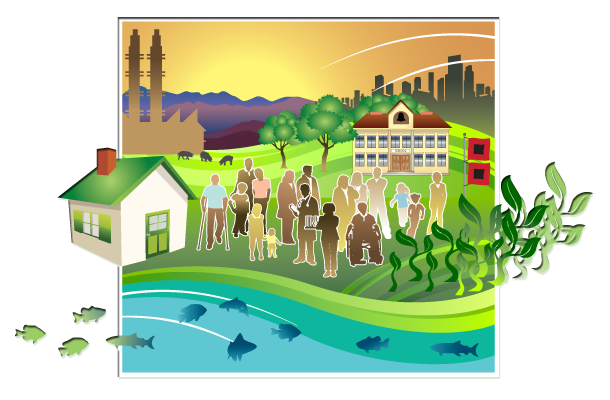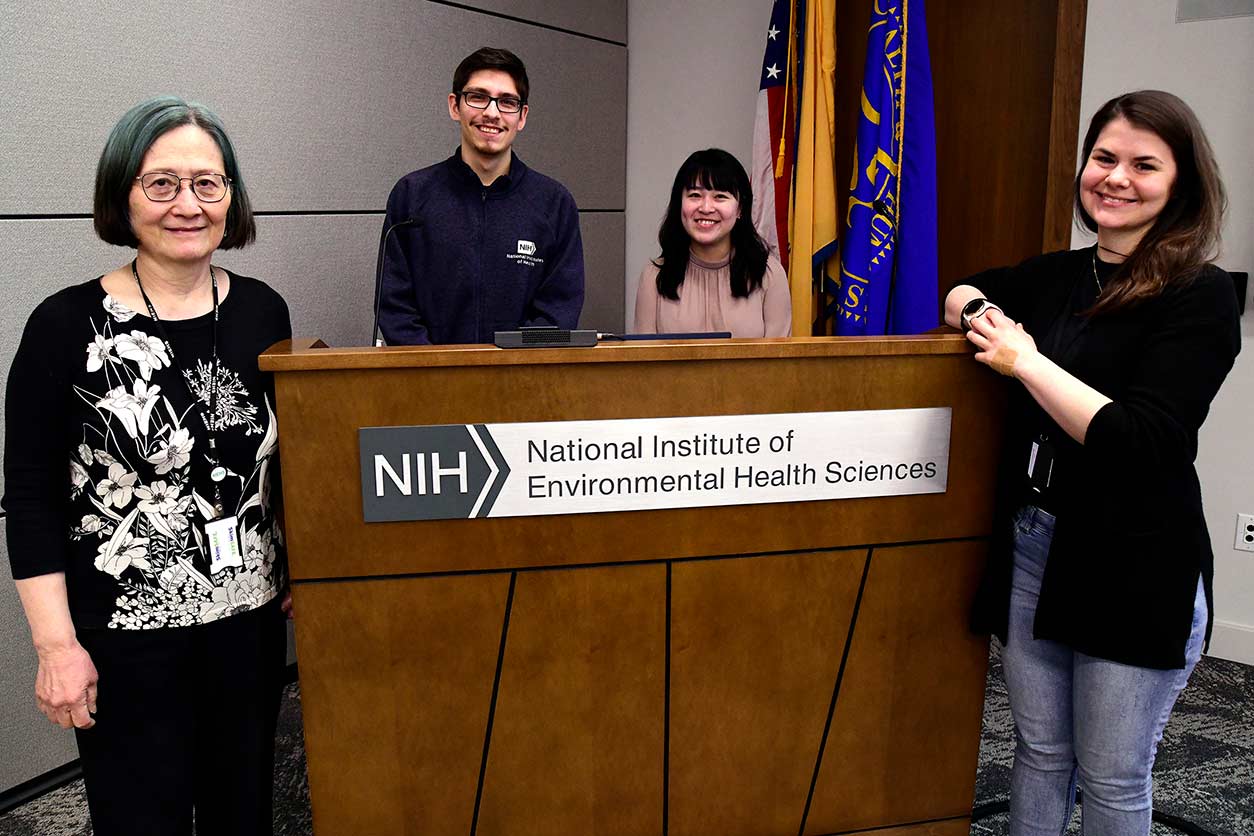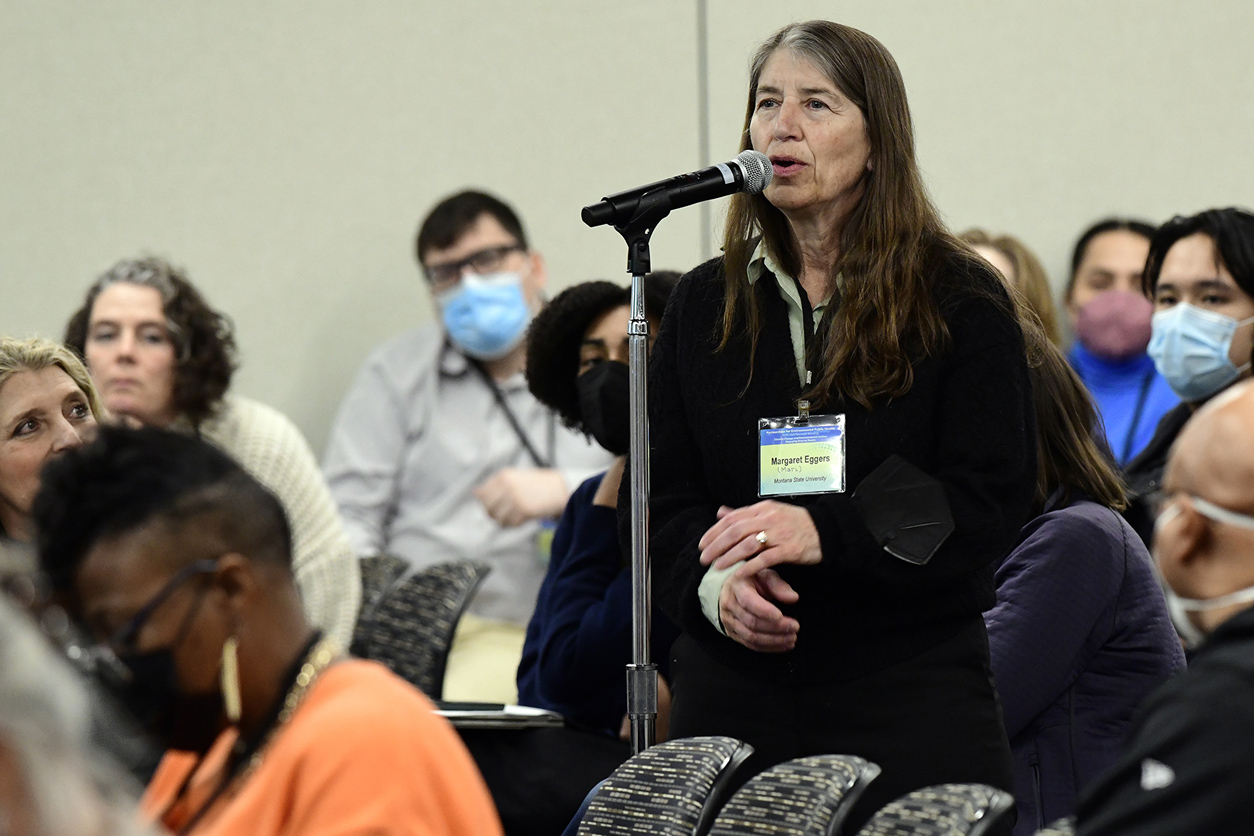Scrap Metal Facility Releases Polluted Dust into Surrounding Neighborhoods
A community-academic research team from the University of Michigan and Detroit-area groups found dust pollution in several neighborhoods could be attributed to an industrial scrap metal processor.
The research was prompted by a ground-buckling upheaval event at a scrap metal facility that caused damage to infrastructure such as homes, roads, and water mains. The event resulted from excessive accumulation of mill scale, a type of scrap metal residue. Nearby residents were concerned about how this event at the facility might affect their health, which led researchers to work with them on a project to learn more about potential contamination.
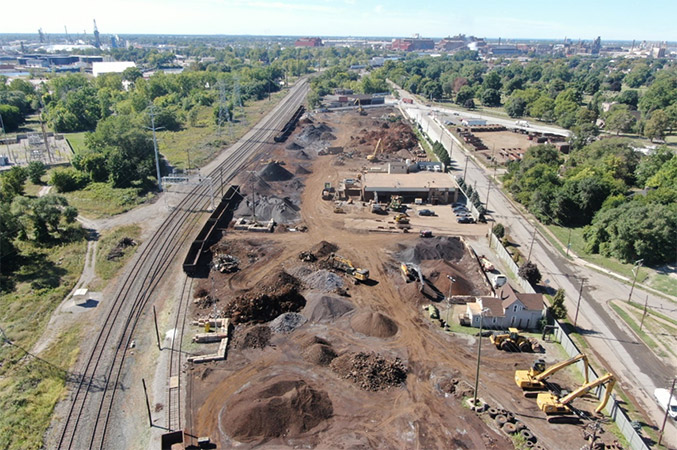
Aerial view of facility looking east. Residential areas are immediately north and south, just beyond the trees. Piles consist mainly of cut or shredded metallic materials brought in by truck and shipped out by rail. Drone photo organized by community. (Photo courtesy of Stuart Batterman)
The team describes its process for sampling and analyzing soil and dust surrounding the facility to address community concerns in a December 2023 paper, published in the journal Environments. The work demonstrates the local impacts of scrap metal facilities and may support future efforts to better control pollution at these facilities.
Engaging the Community to Gather Soil and Dust Samples
Scrap metal processing facilities can contribute to air pollution by releasing fugitive dust (FD), a form of particulate matter that is not released through a smoke stack. It is often transported by wind and traffic and comes from sources such as construction, agricultural tilling, and industrial metal production and processing. Often, FD is tracked by trucks handling and transporting materials or washed off as sediment in rainstorms. This type of dust, which typically accumulates close to its source, is an environmental health concern because it can contaminate soils and adversely affect respiratory and other health outcomes.
After the upheaval, the research partners hosted an event in a neighborhood near the facility to provide residents with information on plans and to answer questions.
The research team collected road dust and surface soil samples from 20 locations around the metal processing facility. Community members collected dust samples from 27 homes by using wipes on surfaces such as windows. The researchers analyzed the samples to determine which metals were present and at what concentrations.
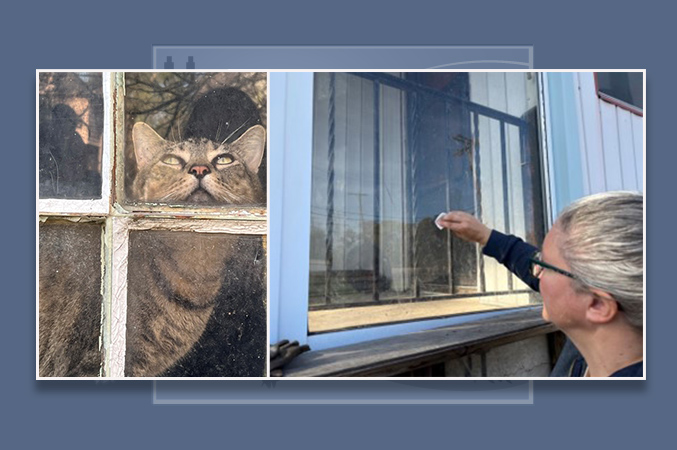
Wipe sampling of windows by community members. An interested party looks on. (Photos courtesy of Stuart Batterman)
The research team also analyzed soil at the facility. Through comparisons, the researchers found that metals in soils from the neighborhoods matched the unique metal profile found at the facility.
“We wanted to learn whether the dust from the facility was contaminated and whether that dust was directly released into areas surrounding the facility,” stated Stuart Batterman, Ph.D., lead researcher on the study. “We found elevated levels of metals in dusts and surface soils at the facility and that local neighborhoods had similar profiles. This profile was unique to the facility because of its high iron content, so it shows neighborhood metal pollution can be traced back to the facility.”
Results Support Community Advocacy Efforts
Metal processing facilities are not often included in inventories of industrial sites tracked for pollution. In fact, the researchers did not find the facility in the EPA National Emissions Inventory, which tracks pollution sources. When conducting an online search for other metal processing facilities, they found 271 unlisted facilities in Wayne County, where Detroit is located.
This study shows that understanding how scrap metal facilities contribute to neighborhood pollution could promote pollution reduction measures. The authors note ways to reduce pollution from metal processing facilities, such as by surrounding the facilities with solid fencing; enclosing operations and stockpiles; washing truck tires to reduce tracking metals outside the facility; paving work areas to reduce the spread of dust on tires and in air; planting vegetation to serve as buffers; and increasing oversight and other controls to reduce pollution, including regular inspections, assessments, and FD monitoring. In the case of the facility examined in this study, solid fencing surrounded the site, and streets were sometimes cleaned.
“Since we found FD from the metal processing facility was out in the community despite some control efforts, it appears that either enhancing existing pollution control measures or implementing additional measures could be useful in this case,” added Batterman. “Our data support community advocacy aimed at obtaining measures that protect public health.”
Raising Awareness About Heat Events One Social Media Campaign at a Time
The National Integrated Heat Health Information System (NIHHIS) and its federal partners will conduct a social media campaign, April 29 through May 3, about the upcoming warm season. The campaign is intended to raise awareness about extreme heat and heat safety by providing information to help people protect themselves before, during, and after heat events. NIHHIS encourages other organizations, such as state and local partners, to participate in the campaign using hashtags #NIHHIS and #HeatSafety. The campaign has daily themes, such as heat-related illness awareness, heat preparedness, and personal risk factors. NIHHIS is a federal interagency information system designed to provide actionable, science-based information to protect people from heat and is comprised of several federal partners, including NIEHS.
NIEHS grantees have created resources on extreme heat. These resources include:
- The Worker Training Program’s Climate Resilience tools and resources.
- The Worker Training Program’s Wildfire Response tools and resources.
- The Worker Training Program’s Wildfire Training Tool.
- University of Michigan’s Climate Change, Extreme Heat, and Heath factsheet.
- University of Michigan’s Extreme Heat and Children’s Health factsheet (also available in Spanish and Arabic).
- University of North Carolina’s Place-Based Explorations for Examining the Science of and Solutions to Extreme Heat curriculum.
- University of Southern California’s Pregnancy and Heatwaves infographic (available in English and Spanish).
Challenges and Recommendations in Policymaking to Address Climate Change Through Behavior
The National Academies of Sciences, Engineering, and Medicine published a new consensus report on the application of behavioral economics in six public policy domains, including climate change. Researchers in behavioral economics try to understand human behavior and decision making based on knowledge from psychology, other behavioral fields, and economic analysis. The chapter on climate change describes challenges in addressing climate change through behavior. One example is that a lot of time may pass between people’s actions that might benefit the climate and their consequences, so people may think their actions have no effect, which in turn, can lead people to doubt scientific information. Additionally, some groups of people, such as people living along coasts, feel the effects of climate change more acutely than others. The rest of the chapter is divided into sections that describe challenges and potential solutions for policymaking in the areas of energy use and efficiency, transportation, and land use decisions. NIH and the Sloan Foundation, a not-for-profit organization that supports impartial scientific research and strengthens public understanding and engagement with science, requested the report.
NIEHS Superfund Research Program Hosts Webinar Series
This spring, the NIEHS Superfund Research Program (SRP) is hosting their 2024 Progress in Research webinar series, showcasing NIEHS SRP-funded researchers who are developing educational programs on occupational health and safety. Awardees will highlight their research projects and accomplishments. SRP is also pleased to welcome speakers from the NIEHS Worker Training Program and the Center for Disease Control and Prevention’s National Institute for Occupational Safety and Health. The series, Emerging Technologies in Occupational Health and Safety, is now open for registration, and the PEPH community is encouraged to join.

PEPH Environmental Health Chat Podcast Series
Climate Change-Related Disasters and Youth Mental Health
PEPH Environmental Health Chat Podcast Series
Climate Change-Related Disasters and Youth Mental Health
People who live through a climate disaster, like a flood or wildfire, may experience trauma, displacement, or food and water insecurity. These stressors can contribute to mental health conditions like post-traumatic stress disorder, anxiety, and depression. Children and adolescents are especially vulnerable to disaster-related stressors because their brains are still developing, and they may lack emotional coping skills. In the latest episode of the PEPH podcast, we’ll hear from Maggie Sugg, Ph.D., who is examining how climate disasters impact mental health in youth and what factors may promote mental health resilience in young people affected by climate disasters. She hopes her research can help communities, clinicians, and counselors better respond to climate-related mental health needs.

PEPH Grantee Highlight
Jamie Donatuto, Ph.D.
When Jamie Donatuto, Ph.D., first presented health information to the Swinomish Tribe’s governing body as an environmental health intern, there was an awkward silence. The chairman thought her presentation on the probabilities of cancer from environmental exposure took a narrow view on health, and he told her to learn the Swinomish way of thinking about health. She spoke with Indigenous people about their perspectives and learned the focus is not only on physiological health, but also the health of the family, community, and natural world. Donatuto was later hired as the Tribe’s full-time environmental health analyst and is now the co-leader of the Community Engagement Core at the Oregon State University Superfund Research Program Center. Her work focuses on protecting the Swinomish from environmental exposures and educating others about Tribal health.
Funding Opportunites
Notice of Special Interest: Women’s Health Research
In alignment with the White House Initiative on Women’s Health Research, the NIH is issuing this Notice of Special Interest to highlight interest in receiving research applications focused on diseases and health conditions that predominantly affect women, present and progress differently in women (e.g., cardiovascular disease; HIV; reproductive aging and its implications), or are female-specific (e.g., uterine fibroids; endometriosis; menopause). NIEHS is interested in research in areas such as the role of environmental factors in fertility declines, the impacts on human development of environmental exposures, and the impact of climate change on diet/nutrition that presents challenges to food security and creates health risks for women, among other topics.
Deadlines: May 7, 2024; June 5, 2024
Support for Research Excellence (SuRE) Award (R16 Clinical Trial Not Allowed)
Supports research capacity building at institutions that award baccalaureate and/or graduate degrees in biomedical sciences, and receive limited NIH Research Project Grant funding. SuRE-supported projects must have student participation in the execution, analysis, and reporting of the research. An applicant institution must demonstrate a commitment to build its research capacity and support for the Program Director/Principal Investigator of the award. This funding opportunity requires a Plan for Enhancing Diverse Perspectives (PEDP) as described in NOT-MH-21-310, submitted as Other Project Information as an attachment (see Section IV). Applications submitted to this funding opportunity for consideration by NIEHS must have a research focus on exposure-health related responses from environmental agents within the mission interest of the NIEHS (e.g., industrial chemicals or manufacturing byproducts, metals, pesticides, herbicides, air pollutants and other inhaled toxicants, particulates or fibers, fungal, and bacterial or biologically derived toxins). The Support for Research Excellence – First Independent Research (SuRE-First) Award (R16 - Clinical Trial Not Allowed) is also open. The purpose of this funding opportunity is to support faculty investigators who have not had prior independent external research grants, to furnish students with high-quality undergraduate and/or graduate research experiences and to enhance the institutional scientific research culture.
Deadlines: May 29, 2024; September 27, 2024; May 28, 2025
Notice of Special Interest (NOSI): Data Informed, Place-Based Community-Engaged Research to Advance Health Equity
This NOSI is meant to stimulate community-engaged research that leverages geospatial data to probe the influence of geographic factors on disease development and health outcomes. Its goal is to use place-based research to help advance health equity in different communities. Applicants must select the IC and associated NOFO to use for submission of an application in response to the NOSI. NIEHS is interested in applications that integrate place-based environmental data with other data types and sources (such as human behavior and time-activity patterns, environmental data collected by low-cost sensor networks or wearable technologies, biomonitoring data, and other molecular or clinical outcome data) to improve exposure estimates at both the community and individual level, to advance understanding of the effects of environmental exposures on health outcomes, and to inform prevention and intervention strategies. Applicants may apply through PA-20-185 or PA-20-195.
Deadlines: June 5, 2024; October 5, 2024
NIH Support for Conferences and Scientific Meetings (Parent R13 Clinical Trial Not Allowed)
Supports high quality scientific conferences that are relevant to NIH's mission and to public health. A conference is defined as a symposium, seminar, workshop, or any other organized and formal meeting, whether conducted face-to-face or via the internet, where individuals meet for the primary purpose of exchanging technical information and views or exploring or clarifying a defined subject, problem, or area of knowledge, whether or not a published report results from such meeting. NIH encourages conference grant applicants to enhance diversity by increasing the participation of individuals from diverse backgrounds, including those from underrepresented groups, in the planning, implementation, and participation in the proposed conference. Eligible organizations include higher education institutions, nonprofits, for-profit organizations, local governments including Indian/Native American Tribal Governments, the Federal government, and other organizations such as faith-based or community-based organizations.
Deadlines: August 12, 2024; December 12, 2024
Intervention Research to Improve Native American Health (R01 Clinical Trial Optional)
Supports research on interventions to improve health in Native American populations, including:
- Etiologic research that will directly inform intervention development or adaptations.
- Research that develops, adapts, or tests interventions for health promotion, prevention, treatment, or recovery.
- Where a sufficient body of knowledge on intervention efficacy exists, research on dissemination and implementation that develops and tests strategies to overcome barriers to the adoption, integration, scale-up, and sustainability of effective interventions.
The inclusion of Native American investigators serving on the study team or as the program director or principal investigator is strongly encouraged. This funding opportunity is part of the Intervention Research to Improve Native American Health initiative, which also includes Intervention Research to Improve Native American Health (R21 Clinical Trials Optional), and Intervention Research to Improve Native American Health (R34 Clinical Trial Optional). For the R01 and R21 funding mechanisms, NIEHS is interested in applications that focus on the development, adaptation, efficacy, effectiveness, implementation, or sustainability of culturally appropriate interventions to prevent or mitigate the health impacts of environmental exposures that disproportionately impact Native American populations. For the R34 funding mechanism, NIEHS is interested in applications that support the initial development of a culturally appropriate clinical trial or research project in preparation for health promotion or disease prevention interventions addressing the health impacts of environmental exposures that impact Native American populations.
Deadline: October 1, 2024
Environmental and Climate Justice Community Change Grants Program
The Environmental Protection Agency (EPA) is accepting applications for its Environmental and Climate Justice Community Change Grants program. The program provides Inflation Reduction Act funds in environmental and climate justice activities to benefit disadvantaged communities through projects that reduce pollution, increase community climate resilience, and build community capacity to address environmental and climate justice challenges. These place-based investments will be focused on community-driven initiatives to be responsive to community and stakeholder input. The entities eligible to apply under this opportunity are:
- A partnership between two community-based nonprofit organizations.
- A partnership between a community-based nonprofit organization and one of the following:
- A federally recognized tribe.
- A local government.
- An institution of higher education.
Other organizations and entities may be able to participate and be involved in the Community Change Grants projects as collaborating subrecipients and/or procurement contractors selected in compliance with competition requirements. The EPA is accepting applications on a rolling basis; therefore, interested applicants are encouraged to apply early. To apply for this opportunity, see the announcement on Grants.gov.
Deadline: November 21, 2024
Upcoming PEPH-related Events
NIEHS Superfund Research Program (SRP) 2024 Progress in Research Webinar Series: Session II (webinar). The second session of the SRP 2024 Progress in Research webinar series will feature three R25 grant recipients from SRP’s portfolio, including projects hosted by the University of Minnesota, Johns Hopkins University, and the University of Michigan. Registration for the SRP webinar is open.
NIEHS Superfund Research Program (SRP) 2024 Progress in Research Webinar Series: Session III (webinar). The third session of the SRP 2024 Progress in Research webinar series will feature one R25 grant recipient from SRP’s portfolio, hosted by the University of Utah, as well as a grant recipient from the Worker Training Program and a representative from the Center for Disease Control and Prevention’s National Institute for Occupational Safety and Health. Registration for the final webinar in the series is open.
Association for Advancing Participatory Sciences (AAPS): Conference for Advancing Participatory Sciences (online). This conference will include keynote presentations and panel discussions on topics related to participatory sciences. There will also be workshops and discussions focused on turning ideas into action and networking events. Registration for the AAPS conference is open.
Columbia University Mailman School of Public Health: Climate Change and Health Boot Camp – Building Skills and Knowledge for Effective Engagement (virtual workshop). This three-day course will provide participants with skills to help improve their public health practice, prepare for impacts from climate change, and integrate climate change information into research and decision-making. Attendees will hear lectures and participate in class exercises and group discussions. Registration for the Climate Change workshop is available. This workshop is part of a series, the Columbia University Mailman School of Public Health: Skills for Health and Research Professionals Program, designed for health and research professionals from all career stages and focuses on providing practical skills.
Columbia Climate School: Extreme Heat Workshop (New York, New York). Climate scientists, engineers, impact researchers, social scientists, and other public and private stakeholders will discuss emerging risks from extreme heat. Participants will assess the state of knowledge on heat hazards, identify community needs and research gaps, and discuss how to build societal resilience to extreme heat. This workshop is hosted by the Columbia Climate School and receives funding from both the National Science Foundation and Columbia Climate Center. The registration deadline is June 15.
National Environmental Health Association’s Annual Educational Conference and Exhibition (Pittsburgh, Pennsylvania and virtual). This year’s theme is New Horizons: Building Bridges to Shape the Environmental Health Future. The conference will have educational sessions on topics such as air quality, climate change, heat waves, data modernization, and artificial intelligence for environmental health. You can view the conference agenda. Registration for the conference (including single-day options) is available.
Columbia University Mailman School of Public Health: Environmental Justice and Environmental Health Disparities (Boston, Massachusetts or live-stream option). This intensive workshop will cover exposure assessment techniques and community engagement and health policy applications in support of solution-driven environmental justice research. The focus of this workshop is to provide training in environmental justice research to environmental health scientists, and will include lectures and hands-on learning experiences. Registration for the Environmental Justice workshop is available. This workshop is part of a series, the Columbia University Mailman School of Public Health: Skills for Health and Research Professionals Program, designed for health and research professionals from all career stages and focuses on providing practical skills.



